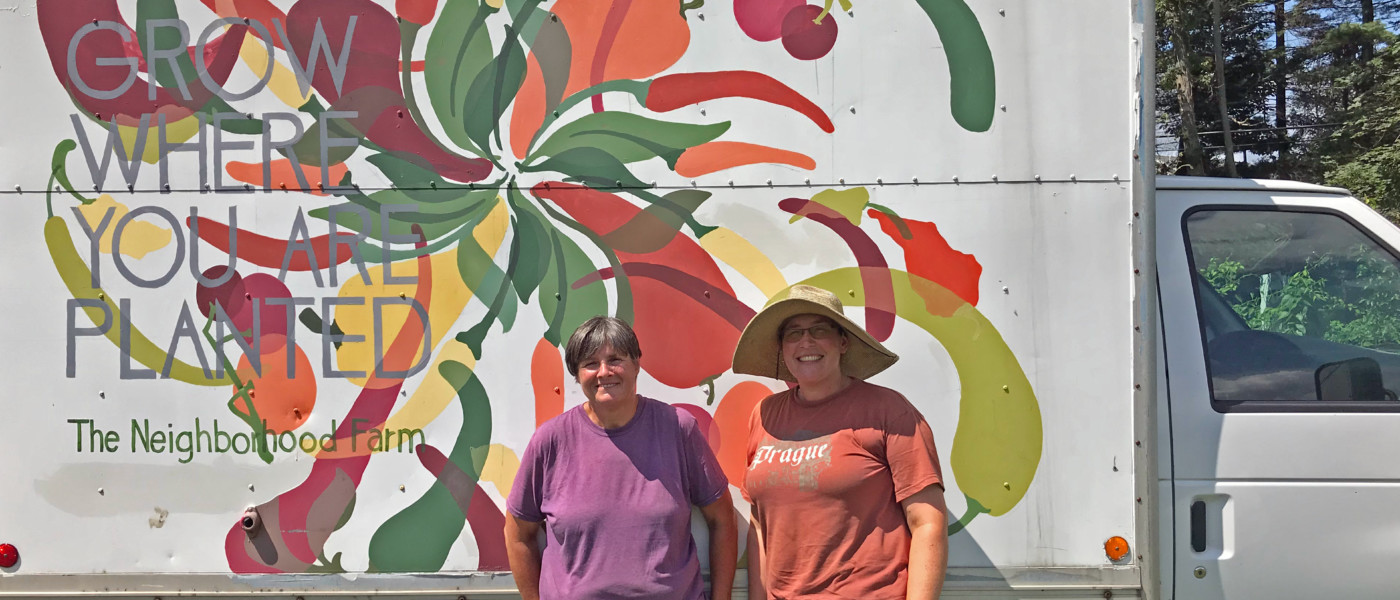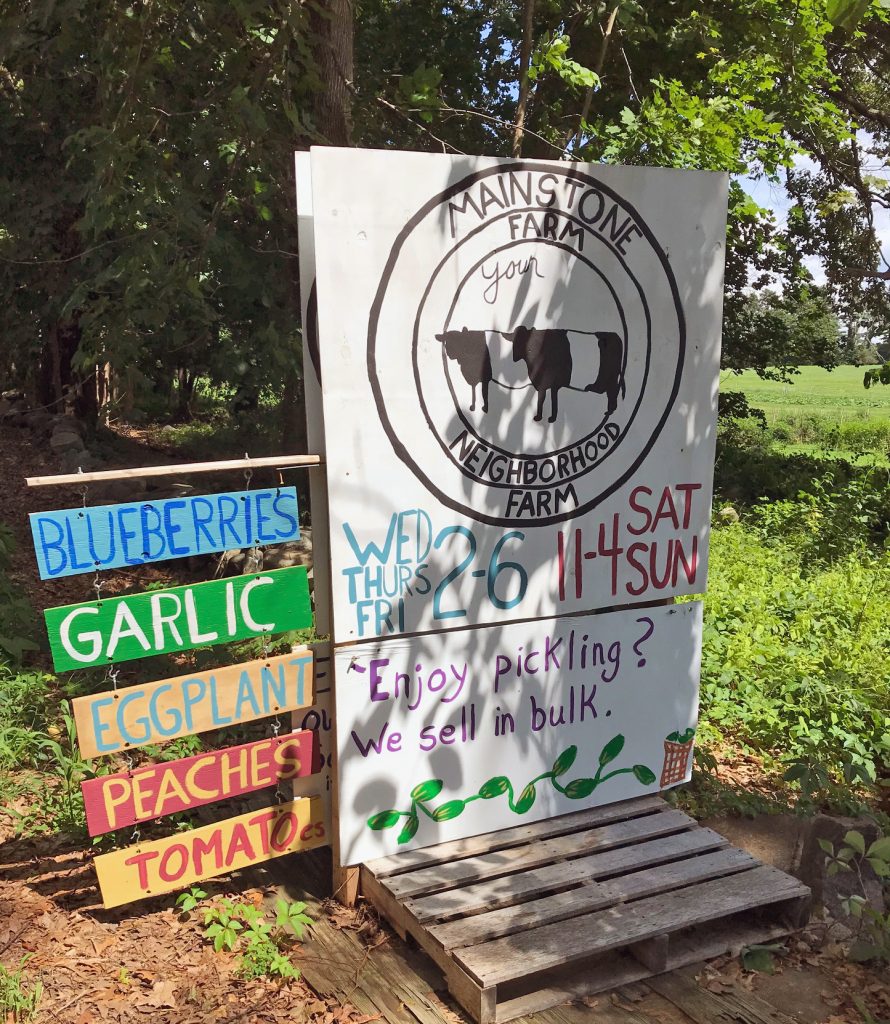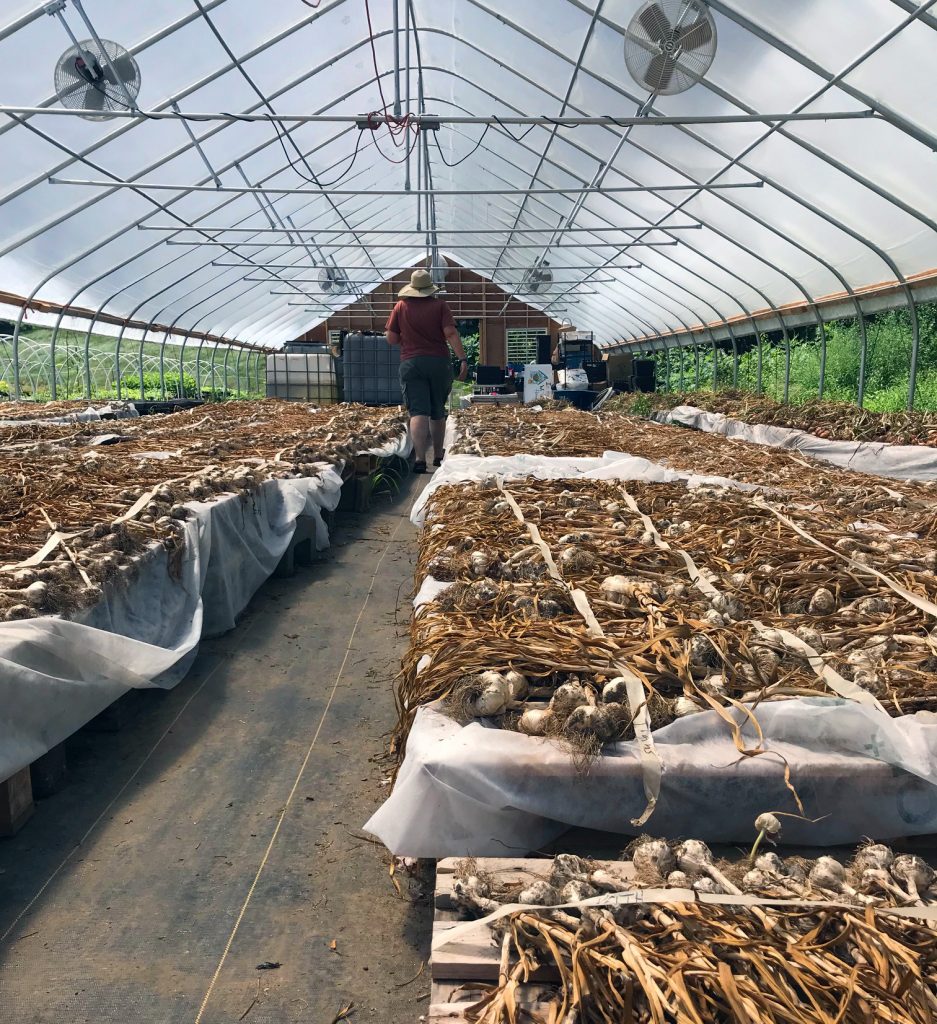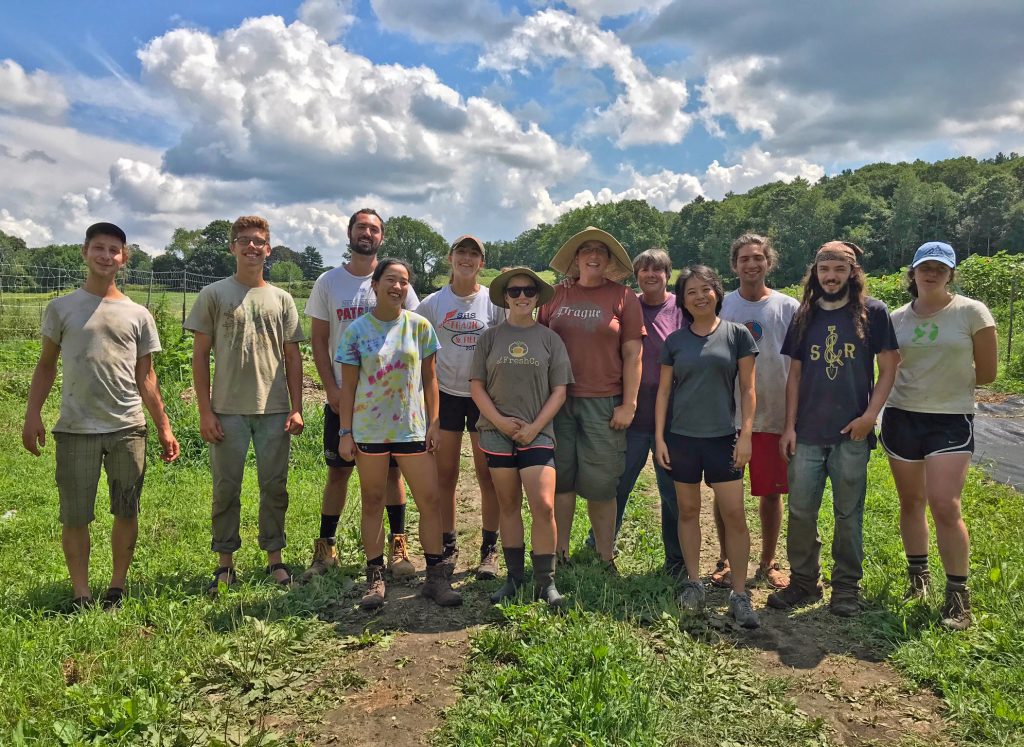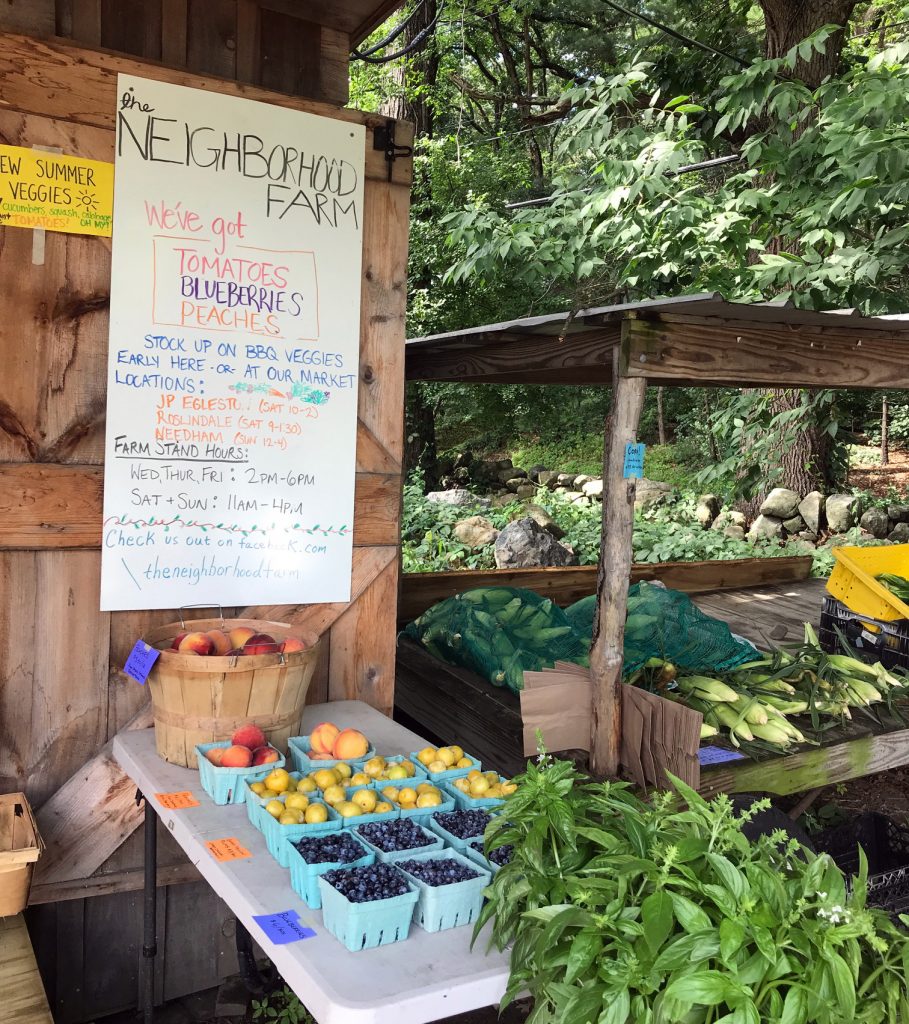In the depths of the winter of 2013, we shared the hopeful story of farmer Kate Canney of The Neighborhood Farm in Needham, MA. Determined to be a farmer, but having no land of her own, Kate was at that time farming about four acres of gardens spread among seven different spaces and selling her produce at farmers markets in the Boston area. We’re excited to share this update about The Neighborhood Farm—one that’s been a long time coming. We’ve stayed in touch with Kate through the years (full disclosure: I’m a CSA member of the farm!) and we followed along with the ups and downs of searching for land. We’re thrilled to report that The Neighborhood Farm has finally found its long-term home, all in one place!
Since our first story, The Neighborhood Farm had evolved from a network of mini-farms in borrowed backyards to a leased space at Powisset Farm, farmland preserved and stewarded by the Trustees of Reservations in Massachusetts. That short-term lease was a temporary upgrade that allowed Kate and her partner Jude to begin a years-long search for the right, long-term home for the farm. Many resources were helpful during this process, such as New England Farmland Finder and the New England Small Farm Institute, as well as local real estate agents and land trusts, particularly because it was unlikely they would buy because of the high cost of land in the area. They even considered a move to Rhode Island. Jude explains, “We seriously considered a half dozen properties, and created a rough business plan for each of them to understand what it would take to move and establish the farm business.” Finally, the planets aligned. Just as their lease was ending at Powissett Farm, Kate and Jude were connected to the Hamlen family, who has owned and operated the historic Mainstone Farm in Wayland, MA, since 1872. The Hamlens wanted to re-establish vegetable production on the 150-year-old farm, and Kate and Jude were a perfect fit.
Mainstone Farm has been home to dairy and beef operations, and currently houses a diversified livestock and haying operation, but 7 acres were available for the future home of The Neighborhood Farm. In 2017, Kate and Jude moved to their new farm, signing a five-year lease. As Kate describes it, “We’re a farm within a farm, so we have all these colleagues and we can share resources and support each other. It’s a great collaboration.”
But, says Jude, “Moving to Mainstone Farm was like starting a brand-new farm.” And even though Kate has been farming for nearly 10 years and Jude for about five, the learning has proceeded at breakneck speed. Learning how to operate a farm stand and understanding their new clientele have been other learning experiences. Mainstone has an established farm stand that the residents of Wayland love to visit. It had previously sold corn, but Kate and Jude didn’t plan to grow corn. They still don’t, aside from popcorn, but they partner with a local farm, Sunshine Farms, to keep their new customer base happy. The corn comes with a bonus: Jim of Sunshine Farms has become a mentor to the young farmers, sharing his 40 years of farming experience.
Having a network of farmer peers is critical, says Kate. “I can’t imagine farming without them.” Kate is particularly close with farmers who are part of the C.R.A.F.T. farmer training program, and she says they often rely on text messages to stay in touch. Kate says, “It’s wonderful to have that group of people to count on – we text each other from the field for technical support, to ask how are you dealing with this or that, to say ‘Are you as tired as I am right now?’” Jude chimes in, “For moral support!” In the winter time, when farmers finally get to take a little time off, the network plans social events that keep farmers connected to each other and give them a chance to have fun. That farmer network is particularly important when disaster hits. “When a woodchuck eats all of your broccoli seedlings, you can put out a call to see if anyone has extras seedlings they can spare. It’s nice to give back too – to help a fellow farmer when you have the opportunity.”
The Neighborhood Farm has been a valuable training ground: Ten former employees are currently running farms and others have gone on to various jobs in the food world.
In addition to finding their farm’s new home, another big change on the farm involves Kate’s partner Jude, who had a full-time job in marketing and sales when Kate first started farming. As Jude tells it, her grandfather had a farm in Iowa, which she’d visit in summer as a kid. It didn’t exactly inspire a love of agriculture in her at that time. But when Jude one day asked Kate if she could set up the farmers market, she demonstrated increased sales and interest and she was hooked. She also fell in love with growing garlic. Today, Jude is a full-time co-farmer with Kate. “I’m learning so much about growing,” Jude says modestly. To which Kate replies, “She’s underselling herself, she’s been doing this full time for about 5 years. She even drives the tractor now!”
One of the challenges that Kate and Jude work against is the reality that there’s never enough labor available. Typically, the farm employs eight workers during the growing season, with full- and part-time workers. The crew is often made up of former crew members, who return when they come back home from college or when they visit their family for a week or two. Kate says, “We welcome our crew to come back at any time, for any length of time. Last weekend we had 17 folks working here!” Jude says, “It’s nice to have people energized and excited about farming. The people who come back to the farm are a burst of fresh air.” And The Neighborhood Farm has been a valuable training ground: Ten former employees are currently running farms and others have gone on to various jobs in the food world. But staffing goes up and down, and now, as their summer workers return to school, the thought of the coming fall harvest without extra hands is daunting.
The Neighborhood Farm sells at their farm stand, directly to restaurants, and at three farmers markets, plus a winter market or two. The markets are important for the chance they provide to teach people about growing food—a main mission of The Neighborhood Farm. Jude says, “We have got a following, as far as people who grow their own food. We love to teach people how to grow food. We don’t see it as competition.” Kate adds, “This year they cleaned us out of our seedlings; we had to keep planting more! We wish we could send the plants out with tracking devices to see how far they go.” People come from New York and across New England for The Neighborhood Farm’s seedlings, including dozens upon dozens of heirloom tomato breeds and the widest variety of heirloom garlic, all tested for performance in the Northeast’s harsh winters.
With Farm Bill season upon us, Kate stressed that state and federal food and farm programs have contributed to the success of The Neighborhood Farm. At the state level, the Healthy Incentives Program (HIP), which just won reauthorization in the Massachusetts state budget, matches SNAP benefits spent at the farmers market. Kate says, “HIP has been huge! We applied for a grant to purchase the equipment we needed to process the payments because we want to make our food accessible to everyone. We thought the income from the program would be small, and all these people showed up. New people began coming to the farmers market who had never been part of the market experience before.” Kate continues, “Having our equipment to process their sale right at our farmers market tent really simplified the process and made people more comfortable about shopping at the farmers market. I hope that HIP’s value has been proven, at this point. People are thrilled when they can get fresh produce, and we’ve been thrilled with the whole thing.”
Kate and Jude have been beneficiaries of a few federal farm programs too. Laughing, they describe one incredibly productive day visiting various USDA offices. “We got a farm loan, learned about a federal program that covered much of the cost of crop insurance for women and other under-served farmers, and applied for a grant so we could build our high tunnel. One stop shopping!” The high tunnel helps them grow the tomatoes for which they are locally famous and allows them to extend their growing season. Having crop insurance is a relief, so they have a safety net should disaster strike. Kate says, “I confess I haven’t read the whole Farm Bill. But it always gives me pause to think about how vast it is… there could be anything hiding in there.” It’s so important to pay attention to farm and policies because, she explains, “People don’t realize the impact fundamental funding changes can make for farmers of all sizes, and therefore for all of society.”
“Farming is like a puzzle, or like an enormous art installation… it’s problem solving. I just love doing it every year and envisioning it, tweaking it, changing it… It’s endlessly satisfying.”
Having experienced a late blight that wiped out Kate’s 2009 tomato crop (pretty much her only crop at that time, back when she farmed yards) to the 2016 drought, when plants had to be hand watered using water trucked in, to the on-going impacts of climate change that bring less predictable weather and crop outcomes, these farmers have seen their share of challenges and uncertainty. But now in year two of their five-year lease, Kate says their current situation “seems cushy.” When pressed on how hard it must be to put your heart and soul into soil that is leased, Kate laughs, “We used to do it with no lease! I long ago made peace with instability, but this land has been in the same family for more than 100 years and they get it.” Jude stressed, “It’s crucial that we have landlords who get it and support it.”
As new farmers, Kate and Jude are among a group that lists their biggest challenge as access to land, and they feel lucky to have finally found a long-term home. Jude revels in the fact that, as she puts it, “Farming is independence. The farm pushes you to do certain things, sure, but it’s your choice to be creative, to come up with ideas.” Kate says, “Farming is like a puzzle, or like an enormous art installation… it’s problem solving. I just love doing it every year and envisioning it, tweaking it, changing it… It’s endlessly satisfying.” Jude says, “It’s hard work.” Kate immediately replies, “Yeah, it is, but it’s good work.”
Both Kate and Jude say they are learning when to step back, “when to let it go and accept you can’t have everything be perfect.” Good lessons for a farmer, and for anyone in life. Kate’s advice for new farmers includes, “Try anything. No matter how improbable it seems. Reinvent yourself, and your business. You may have to do that multiple times.” Jude chimes in, “Farming is Latin for Plan B!” From a person who never thought farming would be any part of her plan, this advice has a double meaning. But anyone who has seen this farm grow from one determined woman to two and from disparate plots to a big, beautiful farm, would say Kate and Jude have found the right place to land.
Kate adds one more piece of advice, “Just keep planting.” And with her way of looking at the positive side of things, she adds, “Even a failed crop is a cover crop that puts good organic matter back into the soil!”
